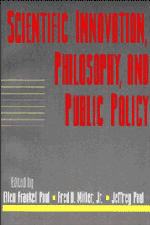Book contents
- Frontmatter
- Contents
- Introduction
- Acknowledgments
- Contributors
- The Human Genome Project: Research Tactics and Economic Strategies
- Choosing Who Will Be Disabled: Genetic Intervention and the Morality of Inclusion
- Germ-Line Genetic Engineering and Moral Diversity: Moral Controversies in a Post-Christian World
- Self-Critical Federal Science? The Ethics Experiment within the U.S. Human Genome Project
- When Politics Drives Science: Lysenko, Gore, and U.S. Biotechnology Policy
- Biotechnology and the Utilitarian Argument for Patents
- Property Rights Theory and the Commons: The Case of Scientific Research
- Property Rights and Technological Innovation
- Medicine, Animal Experimentation, and the Moral Problem of Unfortunate Humans
- A World of Strong Privacy: Promises and Perils of Encryption
- Computer Reliability and Public Policy: Limits of Knowledge of Computer-Based Systems
- Responsibility and Decision Making in the Era of Neural Networks
- Preposterism and Its Consequences
- Index
Choosing Who Will Be Disabled: Genetic Intervention and the Morality of Inclusion
Published online by Cambridge University Press: 04 August 2010
- Frontmatter
- Contents
- Introduction
- Acknowledgments
- Contributors
- The Human Genome Project: Research Tactics and Economic Strategies
- Choosing Who Will Be Disabled: Genetic Intervention and the Morality of Inclusion
- Germ-Line Genetic Engineering and Moral Diversity: Moral Controversies in a Post-Christian World
- Self-Critical Federal Science? The Ethics Experiment within the U.S. Human Genome Project
- When Politics Drives Science: Lysenko, Gore, and U.S. Biotechnology Policy
- Biotechnology and the Utilitarian Argument for Patents
- Property Rights Theory and the Commons: The Case of Scientific Research
- Property Rights and Technological Innovation
- Medicine, Animal Experimentation, and the Moral Problem of Unfortunate Humans
- A World of Strong Privacy: Promises and Perils of Encryption
- Computer Reliability and Public Policy: Limits of Knowledge of Computer-Based Systems
- Responsibility and Decision Making in the Era of Neural Networks
- Preposterism and Its Consequences
- Index
Summary
HOPES AND FEARS OF THE NEW GENETICS
The Nobel prize-winning molecular biologist Walter Gilbert described the mapping and sequencing of the human genome as “the grail of molecular biology.” The implication, endorsed by enthusiasts for the new genetics, is that possessing a comprehensive knowledge of human genetics, like possessing the Holy Grail, will give us miraculous powers to heal the sick, and to reduce human suffering and disabilities. Indeed, the rhetoric invoked to garner public support for the Human Genome Project appears to appeal to the best of the Western tradition's enthusiasm for progress: the idea of improving human lives through the practical application of scientific knowledge.
What is more, the rhetoric of the proponents of the new genetics is explicitly—almost self-consciously—universalistic: genetic science is to serve human beings generally, rather than any particular people or nationality or “race.” In fact, the very understanding which the new science seeks and the manner in which it is sought seem to highlight the importance of what all human beings have in common rather than what differentiates us. And the human genome that is the object of an international network of sequencing and mapping projects is itself a constructed composite, not the genome of any particular person or even a composite representative of any particular group.
Those who advocate social and private investment in the new genetics and support untrammeled scientific freedom to explore the human genome are aware that the “old eugenics”—the social policies of forced sterilization in the United States in the 1920s, 1930s, and beyond, and of the killing of “defective types” in Nazi Germany—casts a long shadow over their endeavors.
- Type
- Chapter
- Information
- Scientific Innovation, Philosophy, and Public Policy , pp. 18 - 46Publisher: Cambridge University PressPrint publication year: 1996
- 1
- Cited by

